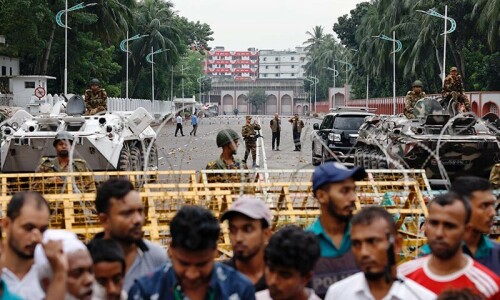THERE’S no getting around it: the buck stops with the prime minister. The Islamabad High Court said as much on Tuesday when it observed that the country’s chief executive and his cabinet were responsible for enforced disappearances in the federal capital.
In keeping with that stance, it sought a list of the prime ministers and cabinet members who had been in office since the time that a computer engineer named Imran Khan was allegedly abducted from his Islamabad residence in 2015. The IHC is currently hearing a petition filed by the missing man’s mother which says there was no case or complaint filed against him in any police station, and that if he was suspected of any crime he should have been proceeded against in court.
That is precisely what the Constitution holds: the rights to due process and security of person are accorded to every individual in this country. When such fundamental rights are trampled upon, a country becomes unmoored from the values that qualify it to be considered a ‘civilised’ nation, and a slide into unalloyed authoritarianism becomes almost inevitable.
The courts in Pakistan are taking an increasingly firm stance against enforced disappearances. Their message is clear: the government and its functionaries cannot simply throw up their hands and claim the matter is beyond their power to resolve. As the IHC’s top judge, Justice Athar Minallah, noted in the case mentioned above, the security, well-being and safety of a citizen is the state’s constitutional obligation. On Jan 1, the IHC took the unprecedented step of imposing a Rs10m fine on several government personnel for their failure in locating another individual, Ghulam Qadir, who has been missing since six years.
Then, a few days ago while hearing the petition filed for the recovery of Abdullah Omar, abducted in 2015, the IHC’s Justice Kayani pointed out: “The state should not ‘serve’ the nation through illegal means.” He also said that if the case was not resolved to the court’s satisfaction, it would take action against the incumbent IG and interior secretary. Earlier last week, a Sindh High Court bench, irked by the state’s inability to trace a person missing for over six years warned of sending the secretaries for defence and the interior to prison for their failure. The bench rejected the report submitted by the investigating officer in the case, saying “This drama will not be tolerated any longer”.
These are but three cases of missing people in what has become a never-ending saga. While the Commission of Inquiry on Enforced Disappearances pursues its mandate in a half-baked manner, it is left to the courts to pick up the mantle for the Pakistanis spirited away for unknown ‘transgressions’ from the quiet backwaters of Balochistan to the crowded streets of the country’s capital. When will the government step up to the task?
Published in Dawn, January 25th, 2021











































